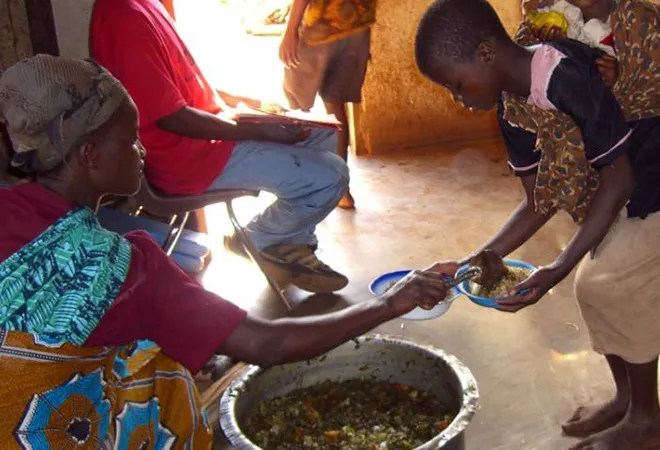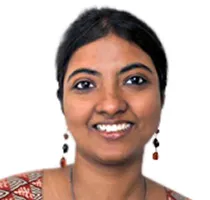-
CENTRES
Progammes & Centres
Location
Given the influence that the G20 has on global governance issues, India can help initiate a global response to address Africa’s food insecurity

The year 2000 is often regarded as a year of economic turnaround for Africa. Before 2000, the most common generalisation about postcolonial African economic performance was that of failure of economic development and governance. However, Western negative perceptions about the African continent slowly changed in the 2000s. Terms like “the hopeless continent” gave way to the “Africa Rising” narrative and international publications referred to fast-growing African countries as “lion economies”. Between 2000–2010, Sub-Saharan Africa grew at over 5 percent per year and six of the world’s fastest-growing economies of this period were also African—Angola, Nigeria, Ethiopia, Chad, Mozambique, and Rwanda.
This was also a period during which the continent made some, if not substantial, improvement in undernourishment. As shown in the figure, the prevalence of undernutrition declined from 24.1 percent in 2020 to 15.6 percent in 2013. However, from 2013 onwards, the hunger situation in Africa worsened. In 2021, 828 million people, or one in every nine individuals, experienced hunger globally, which is 150 million more individuals than in 2019. Africa is home to 278 million people facing chronic hunger, expected to rise to 310.7 million by 2030. The number of stunted children in Africa has also grown from 54.4 million in 2000 to 61.4 million in 2020.
Figure 1: The prevalence of undernourishment in Africa (2000-21)
 Source: FAOSTAT
Source: FAOSTAT
As is clear from Figure 1, from 2019 onwards, there was a steeper deterioration in Africa’s hunger situation. This was mainly due to the COVID-19 pandemic and the Ukraine-Russia war. Job losses during the pandemic adversely affected people’s ability to access food and disruptions in the food supply chains led to food shortages and higher prices of food staples. Travel restrictions and border closures also disrupted food aid programmes in Africa. The Ukraine-Russia conflict was another blow to Africa as nearly 20 African countries import 90 percent of their wheat from Ukraine and Russia. The conflict led to a 60 percent rise in wheat prices in 2022 and one year into the conflict, food prices remain high.
Job losses during the pandemic adversely affected people’s ability to access food and disruptions in the food supply chains led to food shortages and higher prices of food staples.
But the continent’s record in addressing hunger was by no means satisfactory even in the pre-pandemic era or when growth rates were high. Africa failed to meet the millennium development goal of halving hunger and the continent also saw undernutrition increase in all regions of Africa from 2016 onwards. In other words, while short-term shocks like the pandemic and the Ukraine conflict have dealt a heavy blow to Africa’s food insecurity, there are a series of chronic problems like conflict-induced famines, climate change, and low agricultural productivity, which are equally important in Africa’s case and need massive policy actions.
The increase in hunger from 2016 was mainly due to the emergence of famine and famine-like conditions in South Sudan, Somalia, and northeastern Nigeria. Conflict was the main reason behind these famines. The link between conflict and famines is fairly well-established in economic literature. Currently, 80 percent of the 137 million Africans suffering from acute food insecurity live in conflict-ridden countries. The continent is also likely to be most severely affected by climate change because of the low adaptive potential of the African population. The Intergovernmental Panel on Climate Change (IPCC) estimates that temperatures in Africa will rise faster than the world average, and countries within 15 degrees of the equator will experience frequent hot nights and heatwaves. The African continent is likely to become the most water-stressed region of the world, which will significantly affect its food production.
Africa failed to meet the millennium development goal of halving hunger and the continent also saw undernutrition increase in all regions of Africa from 2016 onwards.
Climate change is also causing the migration of insects to Africa. Locust infestation affected 1.25 million hectares of land in Kenya, Somalia, and Ethiopia. Agricultural productivity in Africa is the lowest in the world. Value added per worker in Sub-Saharan Africa (US$1,525.9) is less than half the global average (US$ 4,035.3) and more than 50 times lower than developed countries like the United Kingdom (US$ 55,829.4), Germany (US$43,714.5), the United States (US$100,061.6), and Australia (US$86,838.2). Cereal yield in Sub-Saharan Africa (1.6 t/ha) is also substantially lower than the global average (4.07 t/ha) and yields in other regions—North America (7.23 t/ha), East Asia (6.2 t/ha), Northern Europe (5.6 t/ha), and Central America (3.5 t/ha). Africa’s poor agricultural performance can be traced to the continent’s colonial history. Its colonial masters prioritised the production of export commodities like cocoa and coffee rather than food staples. Even post-independence, African governments failed to support the domestic agriculture sector due to a lack of political will and adverse international agricultural trade terms. Although food security became a priority after the adoption of the Comprehensive Africa Agriculture Development Programme (CAADP) in 2003 and the Agenda 2063, actual investments in agriculture remain low in most African countries.
Given the mounting debt burdens and the lack of fiscal space, most African countries are currently incapable of ramping up investments in the agriculture sector. Therefore, the international community must step up its action. India and Africa have longstanding relations and food security has been a central theme in India-Africa summits. Given the influence that the G20 has on global governance issues, it is the perfect platform for India to initiate a global response to address Africa’s food insecurity. Therefore, India should announce a special G20 package for Africa with a substantial contribution from India itself. The special package should focus on supporting international agencies like the World Food Programme that provide humanitarian assistance and financial and technical support to individual African countries. This could help them address persistent problems like vulnerability to climate change and low productivity.
The special package should focus on supporting international agencies like the World Food Programme that provide humanitarian assistance and financial and technical support to individual African countries.
Announcing a special package for African Food security will lead to many positives. Firstly, it will further strengthen India’s relations with Africa and is firmly in line with its stated objective of being the ‘Voice of the Global South’ during its G20 presidency. Secondly, it will help mainstream African needs and aspirations in the G20 process. Thirdly, it will make a significant contribution to the achievement of SDG 2 (end hunger in all forms) as it is not possible to achieve SDG 2 without addressing Africa’s food security concerns.
Malancha Chakrabarty is Senior Fellow and Deputy Director (Research) at the Observer Research Foundation
Shoba Suri is a Senior Fellow with the Health Initiative at the Observer Research Foundation
The views expressed above belong to the author(s). ORF research and analyses now available on Telegram! Click here to access our curated content — blogs, longforms and interviews.

Dr Malancha Chakrabarty is Senior Fellow and Deputy Director (Research) at the Observer Research Foundation where she coordinates the research centre Centre for New Economic ...
Read More +
Dr. Shoba Suri is a Senior Fellow with ORFs Health Initiative. Shoba is a nutritionist with experience in community and clinical research. She has worked on nutrition, ...
Read More +